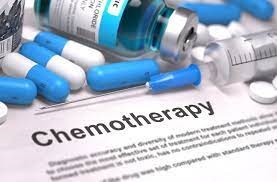Chemo therapy
Chemotherapy
Chemotherapy is the use of anti-cancer drugs. After entering the blood, these drugs travel throughout the body and destroy all malignant cells, both in the primary tumor site (origin) and in the spread areas (metastasis). Chemotherapy can be injected alone (intravenously as serum) or combined with other drugs (such as targeted drugs such as Herceptin) before or after surgery, along with or after radiotherapy. Depending on the type of disease, the patient receives one or more drugs. These drugs attack cancer cells and stop their growth, but they may also cause a little damage to healthy body cells, which is unavoidable.

How does chemotherapy work?
Normally, body cells grow and divide in a completely controlled way, but cancer cells grow and divide erratically and without any control. Chemotherapy drugs are able to destroy cells that have a high growth rate, and by reducing the growth rate and destruction of cancer cells, the symptoms related to cancer are alleviated quickly.
Chemotherapy affects cancer cells in different ways:
- It destroys a part of the cancer cell
- It stops the growth of cancer cells
- It cuts off the necessary food for cancer cells
Different chemotherapy methods
Chemotherapy drugs are prescribed in several ways:
- The method of intramuscular or subcutaneous injection or directly into the cerebrospinal fluid
- Intravenous injection method that is prescribed through an angiocat or through a port in the central veins of the body.
- The intra-arterial injection method in which the chemotherapy drug is directly administered in the arteries feeding the tumor
- Oral method in the form of tablets, capsules or liquid that the patient eats
- The topical or application method in which the chemotherapy drug is applied to the patient's skin
In the treatment of breast cancer, intravenous or oral injection is usually used.
How long does it take to finish chemotherapy?
The duration of injection of each drug depends on the type of drug and treatment regimen. It is the doctor who determines, and it cannot be applied to the treatment plan of other patients, and one patient's plan should not be compared with other patients. Chemotherapy drugs are widely prescribed. Usually, the day they inject is called day "one" and then the next times are adjusted based on the first day, every 8, 15, 21 or 28 days. The time between the first day and the last day of that period is called a cycle.
Complications of chemotherapy
Treatment complications often occur, but it is not known which of them is caused by the patient. That is, it is not necessary to develop all the complications mentioned in the patient, but the most common places where these complications occur are:
- Digestive system (mouth, esophagus, stomach, intestines)
- Bone marrow (blood cells)
- Skin and hair
- Sexual organs (vaginal secretions in women)
But most of these side effects are temporary and disappear completely by giving drugs or special actions.
To get more information on nutrition, you can visit the Breast Diseases Clinic of Motamed Jihad Academic Research Institute or contact the numbers below.
Consultant contact number: 021-66404020 / 09124885127
Reference:
- How to deal with complications caused by treatment, Esmat al-Sadat Hashemi et al
Compiled, written and translated by:
Dr. Ahmad Fazilat
Faculty member, Dept of Genetics, Motamed Cancer Institute, ACECR


